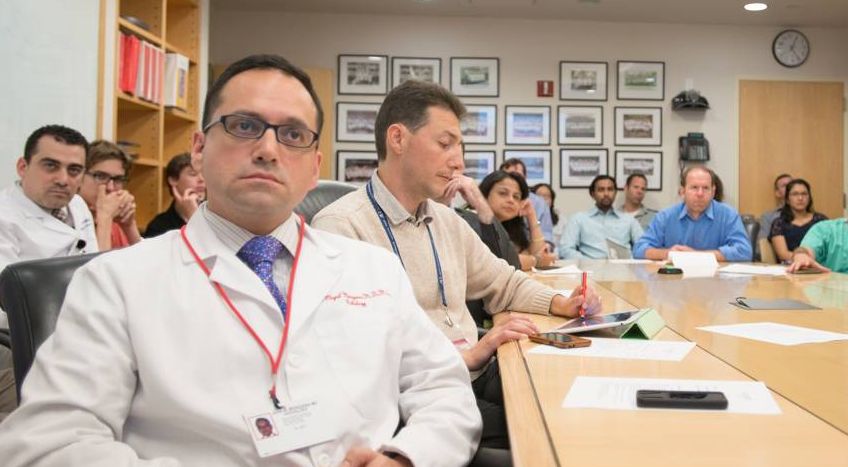For Faculty
Continuing Medical Education
The Englander Institute hosts two regularly scheduled courses approved by the Accreditation Council for Continuing Medical Education. These courses medical education for physicians and scientists are intended for physicians, health care providers and students, and offer one AMA PRA Category 1 Credit per session.
The Continuing Medical Education program is to:
- Provide lifelong educational opportunities for physicians based on identified needs that will lead to improved patients' health care now and for future generations.
- Convey emerging scientific knowledge to physicians and other healthcare professionals by offering educational activities that contribute to improved research and practice in the science, prevention, diagnosis, and treatment of illness and disease.
- Improve physicians' career satisfaction by providing them with educational opportunities that keep them abreast of the latest developments in medicine while simultaneously offering CME faculty and participants the opportunity to interact with one another personally and professionally.
To this end, the Englander Institute offers CME credit for the following:
Precision Medicine Case Conference

Clinicians currently spend valuable time and effort reviewing genomic reports that can span up to hundreds of pages. The rapid advancement of genomic testing prevents healthcare providers from having comprehensive knowledge of genomic sciences as it relates to diagnostics, treatment and clinical management of disease. To improve genomic education, we have established a Weill Cornell-wide Precision Medicine Case Conference to facilitate genomic medicine training for specialty clinicians. This venue improves provider’s understanding of genomic interpretations and genomics-based treatment decisions. These unique centralized forums bring together clinicians, pathologists, computational biologists, genetic counselors and genomics researchers to gain important clinical insights.
While primarily focused on cancer cases, the Precision Medicine Case Conferences present a curated curriculum of both common and rare cases paired with genomic test results and patient history.
Precision Medicine Case Conferences are educational clinical conferences intended to discuss the impact of genomics on clinical care. Members of our multidisciplinary team, including basic scientists, pathologists, molecular biologists and computational biologists examine specific cases and discuss the impact of genomics on clinical care in this educational forum. Participants include faculty and staff from NewYork-Presbyterian Brooklyn Methodist Hospital, NewYork-Presbyterian Queens, Cornell Tech and Cornell Ithaca. The objective of this forum is to improve the gaps in knowledge regarding genomics as it related to diagnostics, treatment and clinical management, through the use of diagnostic tools and proper clinical decision making with regards to sequencing data. Precision medicine research initiatives and relevant data from outside communities are also discussed in this multidisciplinary forum.
Find information about the next Precision Medicine Case Conference here.
Precision Medicine Seminar Series
 The Englander Institute for Precision Medicine Seminar Series provides a monthly forum for senior faculty from external institutions to discuss the impact of genomics on development of disease states and clinical care. Guests include chairs and faculty of premiere institutions, as well as industry executives.
The Englander Institute for Precision Medicine Seminar Series provides a monthly forum for senior faculty from external institutions to discuss the impact of genomics on development of disease states and clinical care. Guests include chairs and faculty of premiere institutions, as well as industry executives.
Precision Medicine Special Seminars welcome a variety of speakers from external institutions and industry. Arranged on an ad hoc basis, special seminars welcome current and potential collaborators to present to WCM faculty and staff.
Find more information about the next Seminar Series here.
Residents, Fellows & Trainees
Clinical and Research Fellowships & Postdoctoral Training Programs
The Englander Institute, together with the Department of Medicine and Department of Pathology & Laboratory Medicine offers clinical and research fellowship opportunities with a focus on precision medicine. With a major exposure to a comprehensive translational research component, this program introduces trainees to new applications of state-of-the-art technologies in patient care.
Clinical Fellowships
Objectives of our clinical fellowship program is intended to help trainees gain expertise in the application of advanced sequencing technologies, familiarize with novel tools to interpret next-generation sequencing data, and to become leaders in the field of Precision Medicine. Clinical fellows act as a bridge between oncologists, pathologists, surgeons, computational biologists and basic scientists, in order to use next generation sequencing of tumor genomes and pre-clinical models in high impact research studies. Responsibilities and learning opportunities include:
- To familiarize with operation of next-generation sequencing platforms.
- To learn about the data processing pipeline and bioinformatics aspects of next-generation sequencing.
- To be involved in the development and validation of research assays in precision oncology.
- To participate in activities including our Precision Medicine Research Conference.
- To develop skills in sequencing data interpretation with computational scientists and bioinformaticians.
Research Fellowships
The Research Pathology Fellow will act as a bridge between pathologists, oncologists, surgeons, computational biologists and basic scientists, in order to use next-generation sequencing of tumor genomes and pre-clinical models in high impact research studies. Responsibilities and learning opportunities include:
- To review histopathology of research projects.
- To familiarize with operation of next-generation sequencing platforms.
- To learn about the data processing pipeline and bioinformatics aspects of next-generation sequencing.
- To be involved in the development and validation of research assays.
- To participate in research pathology-related activities of next-generation biobanking including our pan-cancer Rapid Autopsy program.
- To develop skills in sequencing data interpretation with computational scientists and bioinformaticians.
Postdoctoral Training
Weill Cornell has more than 300 postdoctoral associates and fellows vital to its biomedical research community. Those interested in pursuing postdoctoral training at Weill Cornell are advised to contact individual faculty members whose research they are aligned with. A list of research opportunities at Englander Institute for Precision Medicine can be found on our career site.
Weill Cornell also offers support and career development resources to postdoctoral fellows via the Office of Postdoctoral Affairs.

